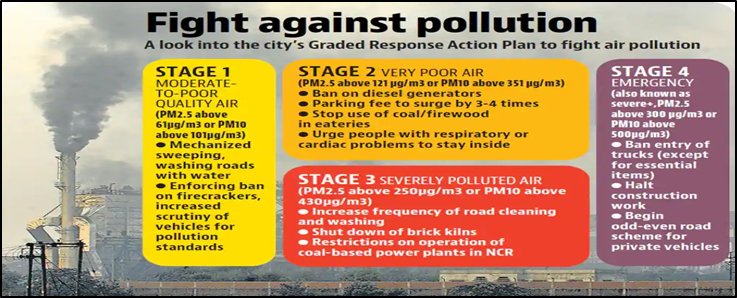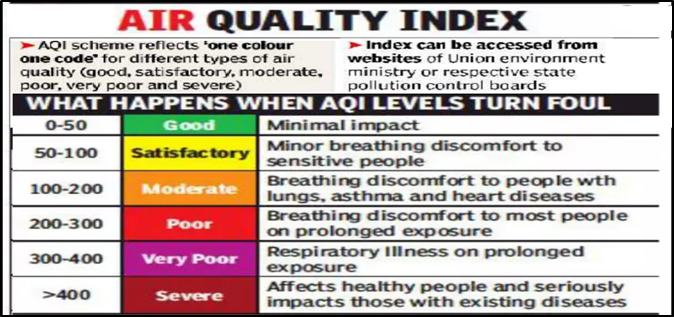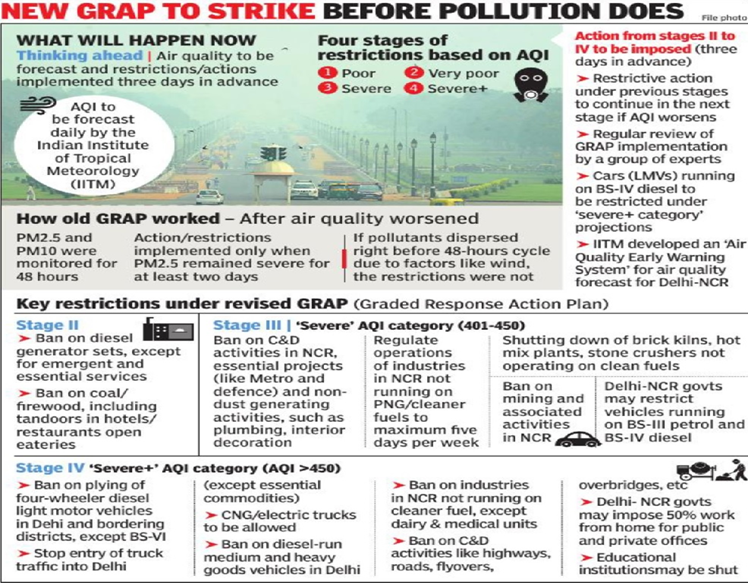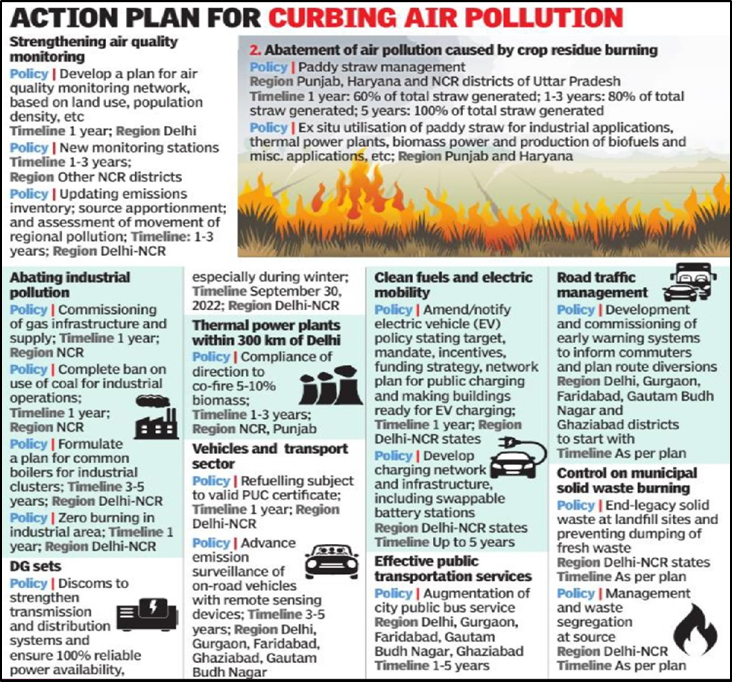In News:
- The Graded Response Action Plan (GRAP), which sets in with emergency measures when air quality worsens in Delhi, is likely to be revised.
- A policy prepared by the Commission for Air Quality Management (CAQM) to curb air pollution in the NCR has recommended revisions to the GRAP.
What’s in Today’s Article:
- Graded Response Action Plan (GRAP)
- AQI
- Commission for Air Quality Management (CAQM)
- News Summary
In focus: Graded Response Action Plan (GRAP)

- GRAP consists of institutionalised measures to be taken when air quality deteriorates.
- It was approved by the Supreme Court in 2016 and notified in 2017.
- The plan was formulated after several meetings between Environment Pollution (Prevention and Control) Authority (EPCA), state government and experts.
- GRAP works only as an emergency measure.
- The plan does not include action by various state governments to be taken throughout the year to tackle industrial, vehicular and combustion emissions.
- It is implemented in graded manner when the air quality moves from ‘Poor’ to ‘Very Poor’, 'Very poor' to 'severe' or others.
National Air Quality Index (AQI)

- It was launched in October 2014 to disseminate information on air quality in an easily understandable form for the general public.
- The measurement of air quality is based on eight pollutants, namely, PM10, PM2.5, NO2, SO2, CO, O3, NH3, and Pb
Commission for Air Quality Management (CAQM)
- CAQM is a statutory body formed under the Commission for Air Quality Management in National Capital Region and Adjoining Areas, Act 2021.
- The commission aims at better coordination, research, identification, and resolution of problems related to air quality in NCR and adjoining areas.
News Summary
- A policy prepared by the CAQM to curb air pollution in the NCR has been made public.
- The policy recommends action in different sectors within a specific timeline to control pollution and meet the National Ambient Air Quality Standards.
Key highlights of the policy:
- Revisions to the GRAP
- Suggested revisions to the GRAP include taking action based on the air quality index (AQI).
- Under the existing system, responses that kick in are based on particulate matter concentrations.
- The changes announced will let the authorities take appropriate measures three days before the situation deteriorates.
- Under the existing plan, action was initiated when pollution levels reached a certain threshold, and not in advance.
- This will be facilitated by the latest technology which will help in anticipating the pollution levels in the near future.
- Curbs will be implemented based on forecasts made by Indian Institute of Tropical Meteorology.

- Four different stages of adverse AQI
- Under the new GRAP for Delhi-NCR, there will be four different stages of adverse AQI:
- Stage I – Poor (AQI 201-300); Stage II – Very Poor (AQI 301-400); Stage III – Severe (AQI 401-450); and Stage IV – Severe Plus (AQI over 450).
- Action plan for curbing pollution

- Pollution goals to be implemented in short-term, medium-term and long-term
- The policy has come up with pollution goals to be implemented in the short term (one year), medium term (2-3 years) and long term (five years).
- It also recommends sector-wise actions to be implemented by Delhi government and NCR states over a given timeframe.
- Specific instructions had been laid out to 14 sectors, among them industries, vehicles, transport, clean energy, construction and demolition, stubble burning, road dust and municipal solid waste incineration.
- Use of clean fuel like PNG for the entire NCR
- The policy advises use of clean fuel like PNG for the entire NCR, not just Delhi.
- In view of the much higher prices of PNG compared with conventional fuels, It also talks about the need for uniform and affordable pricing structure.
- Need to upscale the use of the bio-decomposer solution
- The policy also stressed the need to upscale the use of the bio-decomposer solution to deal with paddy straw in the harvest season of 2022.











